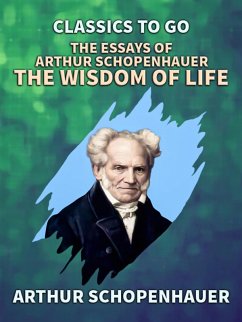The Wisdom of Life represents part of Schopenhauer's work originally titled Aphorismen zur Lebensweisheit and translated by T. B. Saunders. The other part of the original has been translated under the name Counsels and Maxims. However both parts deal with a single treatise, with the being no such division in the original.
Dieser Download kann aus rechtlichen Gründen nur mit Rechnungsadresse in A, B, BG, CY, CZ, D, DK, EW, E, FIN, F, GR, HR, H, IRL, I, LT, L, LR, M, NL, PL, P, R, S, SLO, SK ausgeliefert werden.









